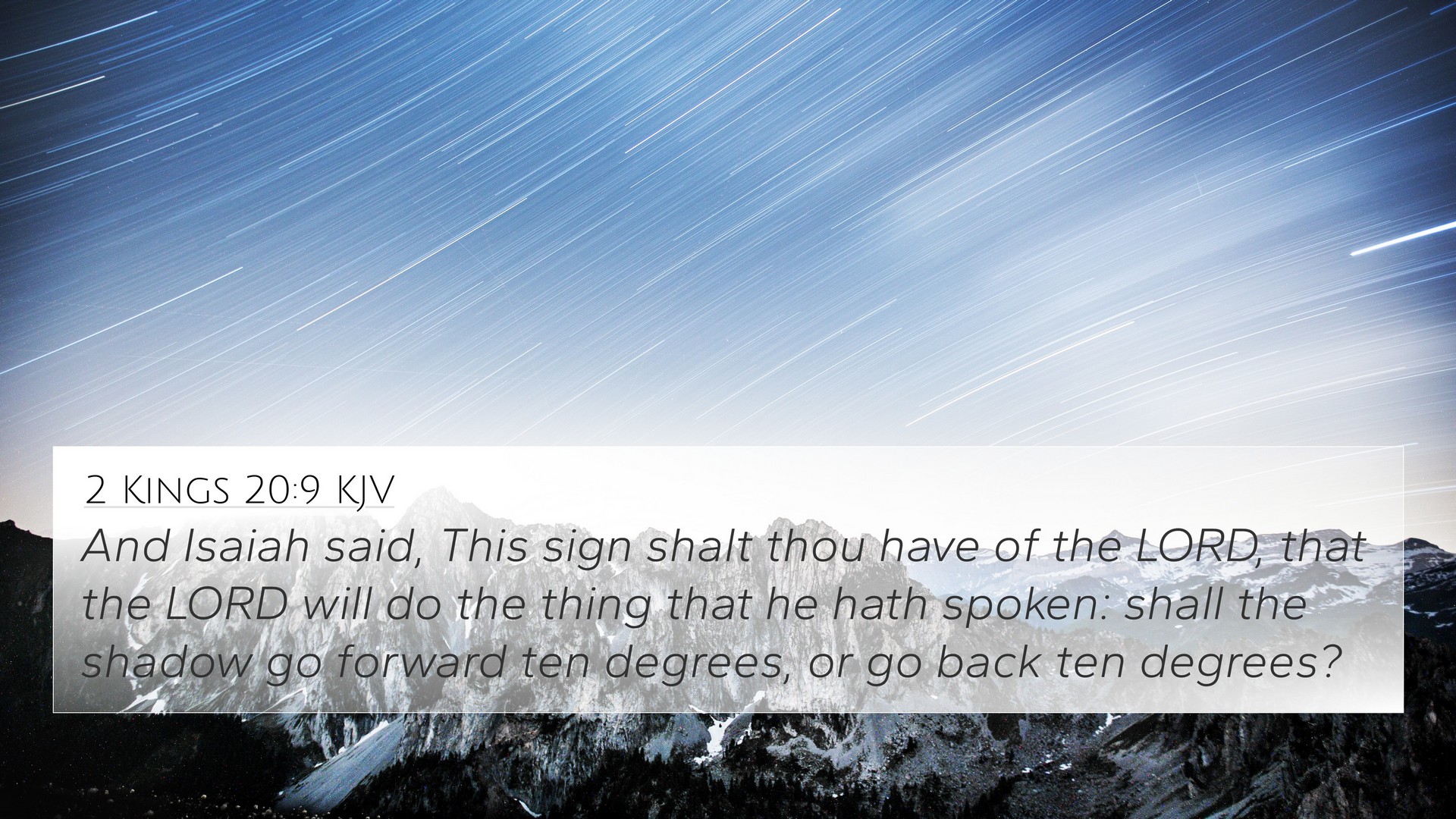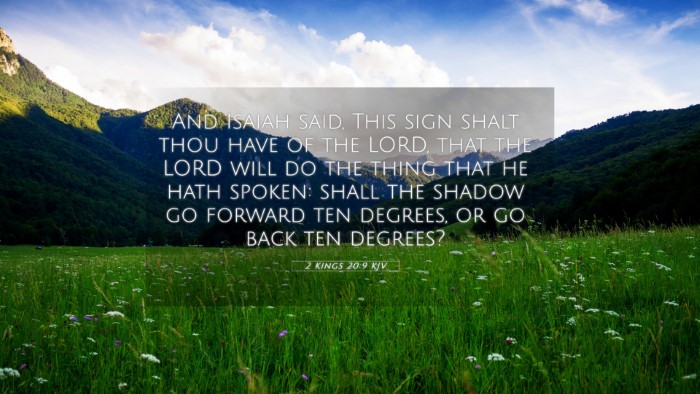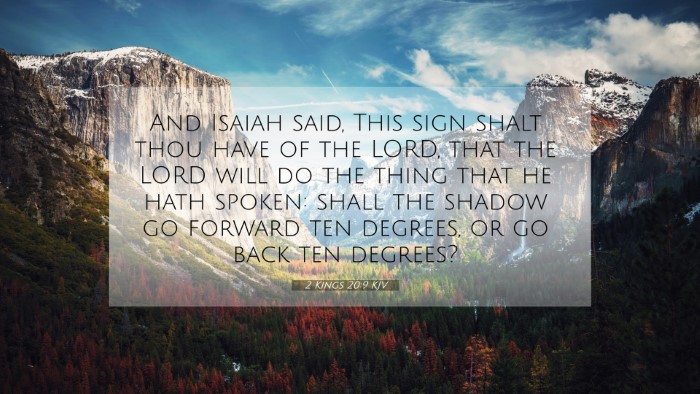Old Testament
Genesis Exodus Leviticus Numbers Deuteronomy Joshua Judges Ruth 1 Samuel 2 Samuel 1 Kings 2 Kings 1 Chronicles 2 Chronicles Ezra Nehemiah Esther Job Psalms Proverbs Ecclesiastes Song of Solomon Isaiah Jeremiah Lamentations Ezekiel Daniel Hosea Joel Amos Obadiah Jonah Micah Nahum Habakkuk Zephaniah Haggai Zechariah Malachi2 Kings 20:9 Similar Verses
2 Kings 20:9 Cross References
And Isaiah said, This sign shalt thou have of the LORD, that the LORD will do the thing that he hath spoken: shall the shadow go forward ten degrees, or go back ten degrees?
Uncover the Rich Themes and Topics of This Bible Verse
Listed below are the Bible themes associated with 2 Kings 20:9. We invite you to explore each theme to gain deeper insights into the Scriptures.
2 Kings 20:9 Cross Reference Verses
This section features a detailed cross-reference designed to enrich your understanding of the Scriptures. Below, you will find carefully selected verses that echo the themes and teachings related to 2 Kings 20:9 KJV. Click on any image to explore detailed analyses of related Bible verses and uncover deeper theological insights.
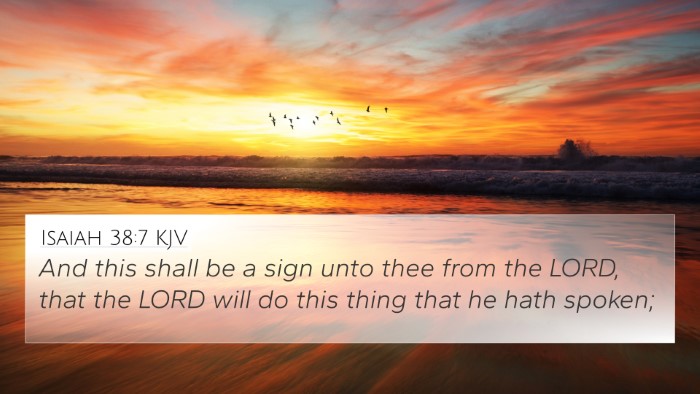
Isaiah 38:7 (KJV) »
And this shall be a sign unto thee from the LORD, that the LORD will do this thing that he hath spoken;
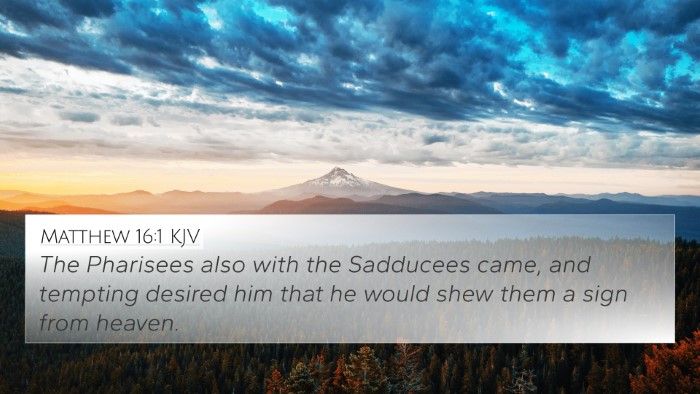
Matthew 16:1 (KJV) »
The Pharisees also with the Sadducees came, and tempting desired him that he would shew them a sign from heaven.
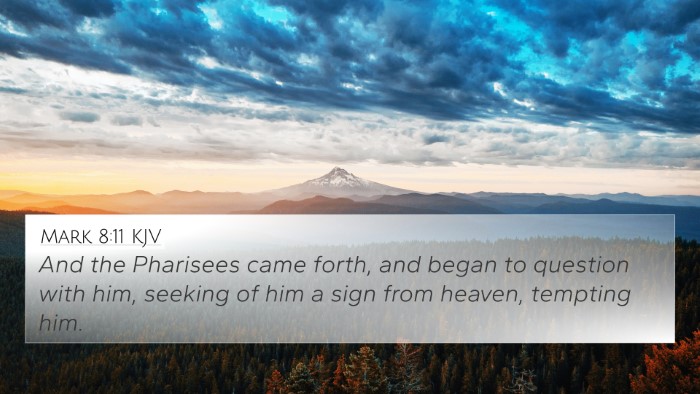
Mark 8:11 (KJV) »
And the Pharisees came forth, and began to question with him, seeking of him a sign from heaven, tempting him.
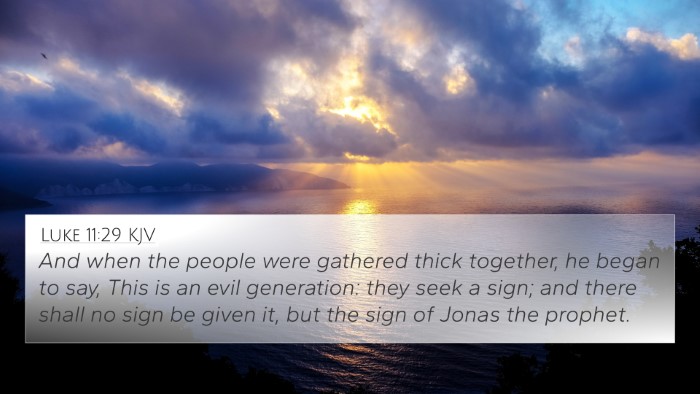
Luke 11:29 (KJV) »
And when the people were gathered thick together, he began to say, This is an evil generation: they seek a sign; and there shall no sign be given it, but the sign of Jonas the prophet.
2 Kings 20:9 Verse Analysis and Similar Verses
Understanding 2 Kings 20:9
Verse: 2 Kings 20:9 - "And Isaiah said, This sign shalt thou have of the Lord, that the Lord will do the thing that he hath spoken: shall the shadow go forward ten degrees, or go back ten degrees?"
Summary of Insights
This verse occurs in a significant moment of biblical history when King Hezekiah is reassured by the prophet Isaiah of God's promise regarding his health and the preservation of Jerusalem. Isaiah offers a miraculous sign to confirm God's word, emphasizing that God is capable of manipulating time and creation to affirm His promises.
Commentary Insights
- Matthew Henry:
In his commentary, Henry highlights the sincerity of Hezekiah as he seeks assurance from God through Isaiah. The sign serves a dual purpose: it reassures the king and serves as a testament to God's power over nature. He emphasizes that this miraculous sign is a demonstration of God's willingness to engage in the affairs of His people.
- Albert Barnes:
Barnes discusses the significance of the sign proposed by Isaiah. He notes that whether the shadow moves forward or backward, it is still an act of divine intervention. This aligns with the traditional biblical understanding of God's sovereignty and omnipotence, as well as His closeness to His people in times of distress.
- Adam Clarke:
Clarke provides a linguistic and contextual analysis of the Hebrew terms used in this verse. He stresses the importance of understanding the scientific implications of the shadow moving, and how this reflects God's control over the laws of nature, showing that God is not bound by them. He emphasizes the theological implications of such a miraculous sign, as it underlines God’s commitment to His covenant people.
Key Themes and Lessons
This verse teaches us about the relationship between God and humanity, where God provides assurance and signs to strengthen faith. The act of asking for a sign illustrates a natural human desire for confidence in divine promises. Below are several themes emphasized in this passage:
- God's Assurance: Hezekiah's request for a sign illustrates the human need for reassurance in faith.
- Divine Control: The manipulation of time via the shadow signifies God's control over natural laws.
- Faith in Action: This moment prompts believers to actively seek confirmation of God's Word through prayer and scripture.
Cross References
Examining related scriptures helps to build a more comprehensive understanding of the themes present in 2 Kings 20:9. Below are notable cross-references:
- Isaiah 38:7-8: This passage records God's additional assurance to Hezekiah, expanding on the significance of the sign.
- Joshua 10:12-13: The event where God makes the sun stand still parallels God's manipulation of light and time.
- 2 Chronicles 32:24-26: A parallel account that highlights Hezekiah's sickness and God’s response.
- Matthew 12:38-39: Jesus speaks of the generation seeking signs, emphasizing faith without needing signs.
- Luke 1:18-20: Zechariah's request for a sign mirrors Hezekiah's inquiry and highlights the nature of responses to divine messages.
- Romans 4:20-21: Discusses faith in God’s promises, showing both Abraham and Hezekiah's insistence on assurance from God.
- Hebrews 11:1: This verse speaks to faith being the assurance of things hoped for, connecting with the theme of expectation in 2 Kings.
Thematic Connections
The deeper implications of 2 Kings 20:9 can be analyzed through the lens of thematic connections between various biblical narratives. The biblical narrative weaves together elements of faith, divine intervention, and the human condition:
- Trust in God’s Word: Throughout both the Old and New Testaments, there is a consistent theme of trusting in God's promises despite circumstances.
- Miraculous Signs: Many accounts, such as Moses and the burning bush, illustrate God's method of confirming His authority and presence through signs.
- Human Seeking Divine Assurance: Many figures in Scripture, like Gideon and Thomas, sought signs or assurance from God, indicating a common experience within the faith journey.
Research Tools for Further Study
For those interested in diving deeper into biblical texts, several resources support the study of cross-referencing Bible verses:
- Bible Concordance: Useful for identifying words and phrases and connecting themes across scriptures.
- Bible Cross-Reference Guide: Offers tools to find related verses quickly.
- Cross-Reference Bible Study: Methods to systematically explore connections between verses and themes.
Conclusion
2 Kings 20:9 serves not only as an account of God's miraculous intervention in Hezekiah's life but also as a reminder of God's intimate engagement with those who seek Him. Through careful study and cross-referencing, believers can find inspiration and guidance for their faith journeys. By understanding the connections within the Scripture, one can appreciate the unity of God's message throughout the Bible.
